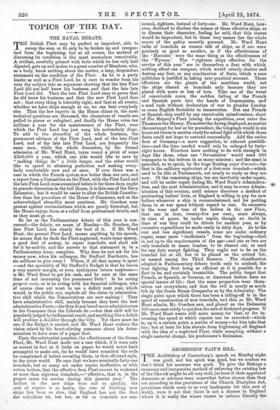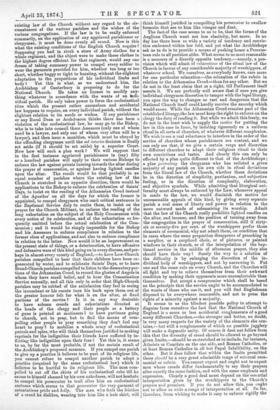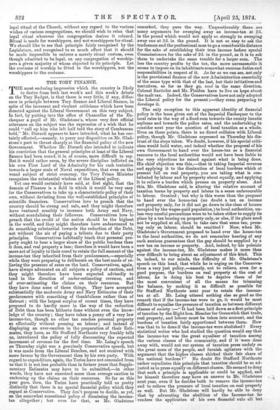ARCHBISHOP TAIT'S BILL.
THE Archbishop of Canterbury's speech on Monday night was good, and his spirit was good, but we confess we don't think his measure was good. To give the Bishops a summary and inexpensive method of enforcing the existing law of the Church might be all very well, (at least if their appointed Assessors or advisers were somewhat better chosen than they are according to the provisions of the Church Discipline Act, provisions which seem to us very inadequate for this sort of work), were it not that there is not a diocese in England where it is really the wisest course to enforce literally the
existing law of the Church without any regard to the cir- cumstances of the various parishes and the wishes of the various congregations. If the law is to be really enforced summarily, on the application of any aggrieved parishioner or clergyman, it must be done evenly all round. Now is this what the existing conditions of the English Church require ? Supposing you had in stock a store of Army clothes for a whole regiment, and the object were to make these clothes in the highest degree efficient for that regiment, would any one dream of taking summary power to compel every soldier to wear the garments provided for him, whether too long or too short, whether baggy or tight to bursting, without the slightest adaptation to the proportions of his individual limbs and body ? Yet this is what, as we understand him, the Archbishop of Canterbury is proposing to do for the National Church. He takes no licence to modify any- thing whatever in accordance with the wants of an indi- vidual parish. He only takes power to force the ecclesiastical rites which the present rather anomalous and accidental law happens to require, on every individual pariah, without the slightest relation to its needs or wishes. If any parishioner or any Rural Dean or Archdeacon thinks there has been a violation of the ecclesiastical law, he may go to the Bishop, who is to take into council three Assessors (only one of whom need be a lawyer, and only one of whom very often will be a lawyer), and then issue a monition, which must be obeyed by the offending clergyman until the ad interim decision is finally set aside (if it should be set aside) by a superior Court. Now how will such a plan work We will suppose that in the first instance aggrieved parishioners in (say) fifty or a hundred parishes will apply to their various Bishops to enforce the law against priests turning towards the altar during the prayer of consecration, or against having lighted candles upon the altar. The result would be that probably in an equal number of parishes where the existing law of the Church is stretched in an opposite direction, there would be applications to the Bishop to enforce the celebration of Saints' Days, to insist on the reading of the Athanasian Creed instead of the Apostles' on all the days for which the former is appointed, to compel clergymen who omit critical sentences in the Baptismal Service duly to recite them, to insist on the prayer for the Church Militant, to enforce the reading of the long exhortation on the subject of the Holy Communion with every notice of its celebration, and of the exhortation so fre- quently omitted before the actual celebration of the Com- munion ; and it would be simply impossible for the Bishop and his Assessors to enforce compliance in relation to the former class of applications, and not also to enforce compliance in relation to the latter. Now would it be an improvement on the present state of things, or a deterioration, to have offensive and defensive wars of this kind going on in every diocese, and per- haps in almost every county of England,—to have Low-Church parishes compelled to hear that their children have been re- generated by water, and to celebrate Saints' Days, or to have Broad-Church parishes compelled to listen to the damnatory por- tions of the Athanasian Creed, to record the glories of Angels in whom they have small belief, and to hear the Commination Service annually, and all this only in order that High-Church parishes may be robbed of the satisfaction they feel in seeing the incumbent or his curate turn his back upon them out of the greater honour felt for what is on the altar, at fixed portions of the service ? Is it in any way desirable to have solemn creeds and exhortations directed at the heads of the clergy and their people as a battery of guns is pointed at mutineers ? to have partisans going to church, not to pray, but to find the means of com- pelling other people to pray something they don't feel any heart to pray ? to mobilise a whole army of ecclesiastical patrols and spies, who will think themselves justified in making reprisals for the indignities their friends have suffered by in- flicting like indignities upon their foes ? Yet this is, it seems to us, by far the most probable, if not the certain result of the Archbishop's proposed measure. If you compel one parish to give up a practice it believes to be part of its religious life, you cannot refuse to compel another parish to adopt a practice (required by the same ecclesiastical law) which it believes to be hurtful to its religious life. The man com- pelled to cut off the skirts of his ecclesiastical robe till he seems to himself shamed by his own nakedness, will not hesitate to compel his persecutor to trail after him an ecclesiastical costume which seems to that persecutor the very garment of ostentatious pride and folly. The man who feels the friction of a creed he dislikes, wearing into him like a hair shirt, will think himself justified in compelling his persecutor to swallow formulae that are to him like vinegar and dust.
The fact of the case seems to us to be, that the forms of the Anglican Church want not less elasticity, but more. In no day has there been so wide a variety of tendency and convic- tion embraced within her fold, and yet what the Archbishops ask us to do is to provide a means of pushing home a Procrus- tean rule to all parishes alike. What seems to us most reasonable is a measure of a directly opposite tendency,—namely, a pro- vision which will admit of relaxations of the ritual law of the Church in favour of any considerable majority of worshippers, of whatever school. We ourselves, as everybody knows, care more for one particular relaxation—the relaxation of the rubric in relation to the Athanasian Creed—than for any other. But we do not in the least claim that as a right, till Parliament itself asserts it. We are perfectly well aware that if once you give individual clergymen discretion to tamper with the legal liturgy, you open the way to changes so vast and dangerous that the National Church itself could hardly survive the anarchy which would ensue. While the Athanasian Creed remains part of the established liturgy,the law must keep the right to enforce on the clergy the duty of reading it. But while we admit this freely, we do not in the least wish to supply the motive for putting the law in this case in force, by insisting rigorously on a uniform ritual in all sorts of churches, of whatever different complexion. We wish to see a real reluctance to interfere in the order of the service of churches whose parishioners are content, and we can only see that, if we give a certain verge and discretion to different churches to adapt their religious ritual to their own convictions and tastes. And clearly this can only be effected by a plan quite different to that of the Archbishops ; a plan protecting the clergyman who has enlisted a given majority of any parish on his own side in ritual deviations from the literal law of the Church, whether those deviations be in the direction of simplicity, puritanism, and subjective feeling, or in the direction of complexity, elaboration, and objective symbols. While admitting that liturgical uni- formity must always be enforced by the Law, whenever appeal is made to the law, we would diminish the motive for unreasonable appeals of this kind, by giving every separate parish a real sense of liberty and power in relation to the mere outward mode of solemnising its worship. Admit that the law of the Church really prohibits lighted candles on the altar, and incense, and the position of turning away from the congregation in the prayer of consecration, still if sixty- six or seventy-five per cent. of the worshippers prefer those elements of ceremonial, why not admit them, on condition that in cases where the same proportion disapprove of preaching in a surplice, or a surpliced choir, or of pictures, or painted windows in their church, or of the interpolation of the bap- tismal service in the middle of afternoon prayer, they also should have their way ? Surely the way to a solution of the difficulty is by enlarging the discretion of the in- dividual body of worshippers, and not by narrowing it. Put one and the same rule on every Church, and the Churches will all fight and try to relieve themselves from their awkward condition by making their opponents more uncomfortable than themselves. But accept a compromise which shall be based on the principle that the service ought to be accommodated to the wants of those who use it, and you will find Englishmen disposed to be everywhere reasonable, and not to press the rights of a minority against a majority.
It seems to us the blindest possible policy to attempt to disguise from ourselves the fact that the National Church of England is a more or less accidental conglomerate of a good many different Churches,—the stronger and better, no doubt, in very many respects for the variety of the elements she con- tains,—but still a conglomerate of which no possible jugglery will make a dogmatic unity. Of course it does not follow from this that the diversity of creed should be allowed to go beyond given limits,—should be so stretched as to include, for instance, Atheists or Comtists on the one side, and Roman Catholics, or at least Roman Catholics in all but Papal Infallibility, on the other. But it does follow that within the limits permitted there should be a very great admissible range of external cere- monial or rubric. You cannot expect and ought not to expect men whose creeds differ fundamentally to say their prayers after exactly the same fashion, and with the same emphasis and expression. Clearly a good deal must depend on the'essential interpretation given by the worshippers to the Church's prayers and promises. If you do not allow this, you ought not to allow so wide a range of interpretation at all. So far, therefore, from wishing to make it easy to enforce rigidly the legal ritual of the Church, without any regard to the various wishes of various congregations, we should wish to relax that legal ritual wherever the congregation desires it relaxed. Ritual is made for worshippers, and not worshippers for ritual. We should like to see that principle fairly recognised by the Legislature, and recognised to so much effect that it should be made impossible to enforce a merely ritual custom, even though admitted to be legal, on any congregation of worship- pers a given majority of whom objected to its principle. Let the costume of worship be fitted to the worshippers, not the worshippers to the costume.




































 Previous page
Previous page